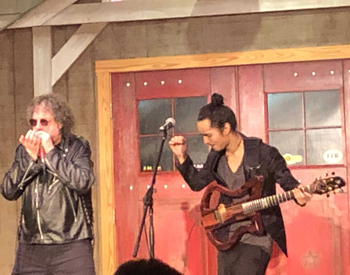It’s too bad Fur Peace Ranch doesn’t have a marquee because seeing the billing of Magic Dick and Hot Tuna in lights would’ve been priceless.
As it went, hearing the former J. Geils Band harp player paired with virtuosic, wonder-kid guitarist Shun Ng headlining over Acoustic Hot Tuna was also priceless, as the headliners put on one of those impossible-to-believe concerts and Hot Tuna were their typically terrific selves during their warm-up slot.
From the opening notes of “Let the Good Times Roll,” it was clear Dick, in shades and leather, and Ng, with a man bun and hip clothing, had something special going as the former started off on a bass harmonica – one of several harps he kept in a case next to him – and Ng immediately proved himself a guitarist who uses his influences to meld himself into something unique. With hints of Steve Howe, Tommy Emmanuel, Stanley Jordan and Leo Kottke in his fingers, Ng makes his acoustic-electric hybrid sound like multiple instruments as he slaps the bottom strings as if he’s playing bass, employs a clawhammer style to coax notes and combines fleet chording, well-placed harmonics, fingerpicking and ferocious strumming to create an ample floor for Dick’s harmonic(a) histrionics.
Dick referred to the pairing as a “manifest duo” and the music proved it on originals like Dick’s “Dixology” and Ng’s “Walls” and particularly on the covers that littered the set, songs by the likes of Sonny Boy Williamson II, Miles Davis, Jim Hendrix and others.
Williamson’s “99” found the duo playing the blues with authority, while Davis’ “So What” was nearly 15 minutes of improvisation that went way out there without ever becoming untethered from the trumpeter’s original melody and the performances left the sold-out Fur Peace Station hanging on every note and every space between them as the musicians put a new shine on an old classic.
They slipped a bit of “Bring it on Home to Me” into the middle of a lengthy workout on “Key to the Highway” and Ng called on the audience to “let Dickie take over” as the pair offered up an incendiary rendition of Hendrix’s “Fire.” To call it hot is an understatement on the order of calling the Arctic cold.
That Dick, 73, and Ng, 28, have mad respect for each other is evident in their on-stage interactions, such as when Ng sat down while Dick performed the solo “Peach Tree” and he could be seen smiling and heard singing off-mic harmonies to accompany his elder mate. Ng followed this by playing Queen’s “Bohemian Rhapsody” all the way through as Dick and the rest of the house watched and listened in wide-eyed and wide-eared amazement as the young guitarist and singer recreated the song’s impossibly difficult changes with seeming ease.
When he finished, the Station exploded in an ovation that was probably heard across the Ohio River in West Virginia. The 90-set set concluded with a rambunctious reading of Giles’ “Whammer Jammer” and the single encore of James Brown’s “Papa’s Got a Brand New Bag” that was followed by a standing ovation that lasted nearly as long as the song.
And Dick and Ng earned every single second of it.
Though it might have seemed magnanimous for Jorma Kaukonen to allow the duo to headline at his venue, the guitarist likely knew that following them would have been to die on stage on his home turf. So open Acoustic Hot Tuna did – and did exceedingly well as always, concluding their hourlong opening set with a shimming “Water Song,” a number that shone on their intuitive interplay that comes only from five-plus decades of music making.
The former Jefferson Airplane co-pilots, guitarist Kaukonen and bassist Jack Casady, performed under the Hot Tuna and Jorma license plates Kaukonen has accumulated over the years and that hang in his concert hall. The duo sprinkled their performance with workhorses both spiritual and secular – songs like “Good Shepherd” and “Let Us Get Together Right Down Here” and “Hesitation Blues” and “Barbecue King.”
Inside the tiny Fur Peace Station, the sound of Kaukonen and Casady’s fingers fretting their instruments provided percussive nuances to the music each made as the notes wrapped around one another, twisting and unfolding in a mix of blues and gospel with nary a hint of the psychedelia on which they originally staked their musical careers.
Casady was mostly silent, save for a couple of comments about his new bass, on which he provided a musical mattress for Kaukonen’s leads when he wasn’t playing lead himself. He spoke to his partner with knowing glances and smiles and – when given the option – picked “Water Song” to end on. Kaukonen, meanwhile, told Casady the new instrument sounded great and remarked, “when the bass player’s smiling, the guitar player’s happy.”
And that made the audience – and Casady – happier still.



No Comments comments associated with this post